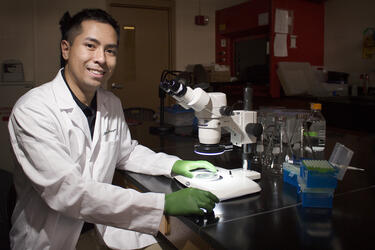Matthew Almazan, '17, B.S., Biological Sciences
December 2, 2017

December 2, 2017
Eugene Matthew Almazan, graduated from the Department of Biological Sciences spring 2017. Presently, he is a medical student in the Boonshoft School of Medicine. Matt is working towards his professional dreams to use the tools of innovation and science in the service of others. As an undergraduate, he embraced so many of the opportunities available to students at Wright State creating a rich and meaningful experience.
Why did you choose Wright State University?
I was interested in pursuing higher education at an institution that celebrates the individual but has a strong sense of community
Finding the right college means finding the right fit. See all that the College of Science and Math has to offer by visiting campus.